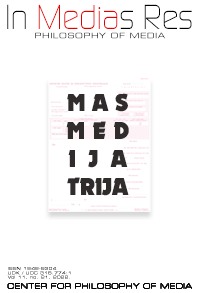Sulejmanpašić i Zelizer: Oživljavanje novinarske profesije
Sulejmanpašić and Zelizer: Returning to the Journalism
Author(s): Amela DelićSubject(s): Media studies, Theory of Communication, ICT Information and Communications Technologies
Published by: Centar za filozofiju medija i mediološka istraživanja
Keywords: Sulejmanpašić; Zelizer; journalism; digital media; profession; credibility;
Summary/Abstract: Although the book Journalism – the Destroyer of Humanity is one of the most sharply intoned critical reviews of journalism we have read, we believe that this book is also some kind of a call for change. It is interesting that back in 1936 Sulejmanpašić accurately dissected journalistic reality, distinguishing sensational journalism from professional journalism. Thus, he leaves us room for a different, purposeful and visionary journalism. The author discusses the impact of journalism on various spheres of human social and his psychological life, and this impact is, from his perspective, mostly negative. Although the lessons of Sulejmanpašić’s book are profound, and the arguments are so strong that they are difficult to refute, we want to believe that there is still hope for the journalistic profession. This paper will compare the reflections of Dževad Sulejmanpašić and Barbie Zelizer in their different, but somewhat similar, views of the profession. While Sulejmanpašić emphasizes and perfectly recognizes all the shortcomings of the profession, Zelizer gives recommendations and in a different, modern digital or online context, devising journalism that would serve humanity, instead of destroying it.Although the book Journalism – the Destroyer of Humanity is one of the most sharply intoned critical reviews of journalism we have read, we believe that this book is also some kind of a call for change. It is interesting that back in 1936 Sulejmanpašić accurately dissected journalistic reality, distinguishing sensational journalism from professional journalism. Thus, he leaves us room for a different, purposeful and visionary journalism. The author discusses the impact of journalism on various spheres of human social and his psychological life, and this impact is, from his perspective, mostly negative. Although the lessons of Sulejmanpašić’s book are profound, and the arguments are so strong that they are difficult to refute, we want to believe that there is still hope for the journalistic profession. This paper will compare the reflections of Dževad Sulejmanpašić and Barbie Zelizer in their different, but somewhat similar, views of the profession. While Sulejmanpašić emphasizes and perfectly recognizes all the shortcomings of the profession, Zelizer gives recommendations and in a different, modern digital or online context, devising journalism that would serve humanity, instead of destroying it.
Journal: In Medias Res
- Issue Year: 11/2022
- Issue No: 21
- Page Range: 3497-3510
- Page Count: 14
- Language: English

